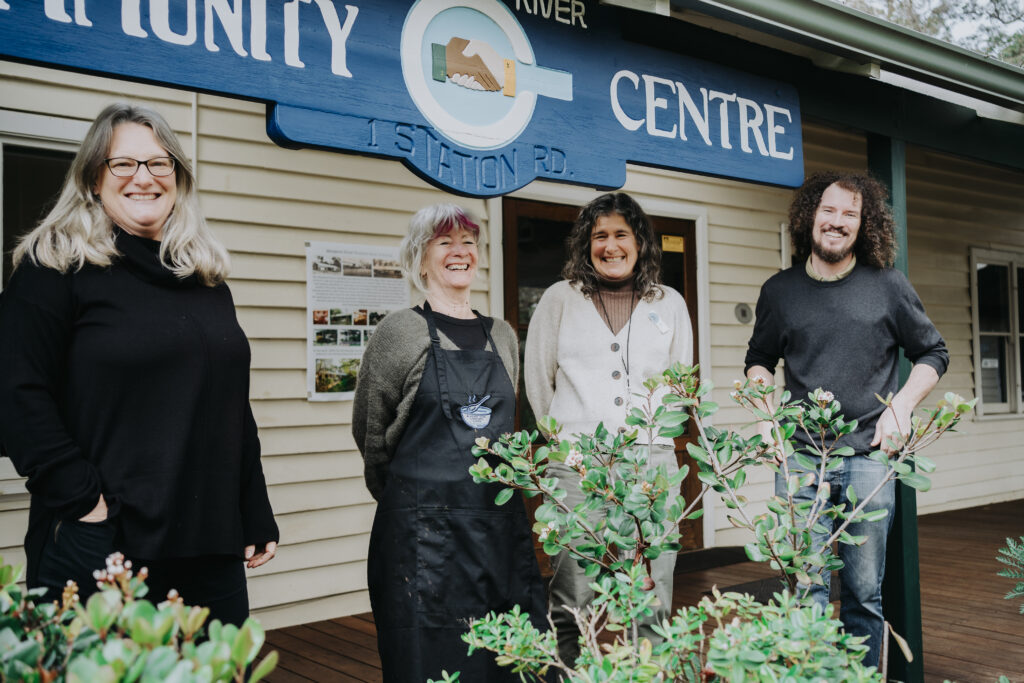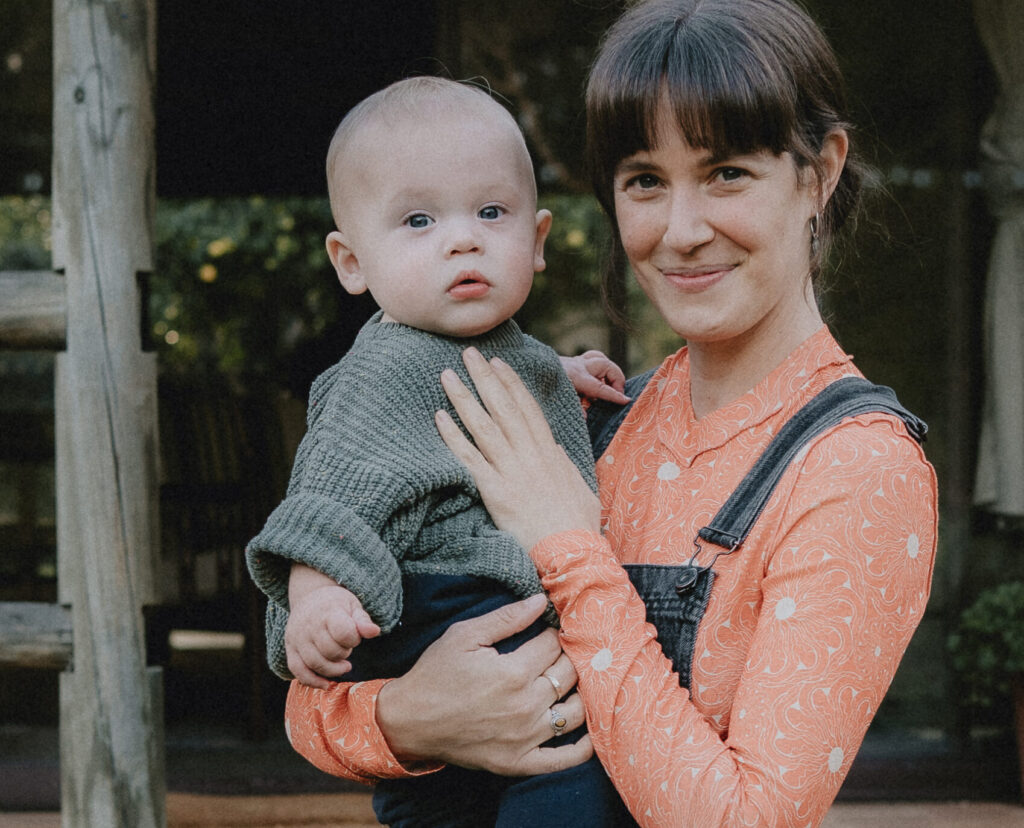The beating heart of our community

Today we sat down with Lydell Huntly – Centre Manager at the Community Centre. As locals here, chances are, you or someone you know has attended this service. I will add here that for me personally, when I arrived in Margaret River, both the playgroup and the toy library became a haven of mine. An opportunity to meet other local mothers, build community and gain valuable friendships, for myself and my daughter. Let’s not forget the exchanging of endless toys for a spirited toddler. (Thank you Toy Library).
In this interview we sat down to discuss the history, the incredible staff and some of the invaluable services that the community centre has to offer.
Firstly, thank you for taking part in this campaign interview for your service. We will start with a little bit of background on yourself and your journey within the community centre.
Can you share a bit about your background and what led you to work at this community centre?
I am a Social Worker with 28 years working experience in a range of fields, working in youth work, women’s refuges and community development and support services. I moved to Margaret River 25 years ago and have been employed by the MRCC for 22 of those years in various capacities, becoming the Centre Manager in 2016.
In all those years, the MRCC has been a community hub for a wide range of community groups, support services and government community services. This is what the community fought for when they saved the Old Hospital complex form being demolished and the site redeveloped when the new hospital was built. The community vision for a venue for community supports and services has now been in operation for almost 35 years.
The MRCC has always been a place where people have come for support, for information and to access other community groups and supports. It has been an honour to work with great committee members and staff to maintain the 100-year-old heritage listed building and to operate the Soup Kitchen, Community Centre for Children, our Emergency Relief service and more recently the Staying in Place program.
What does a typical day look like for you as the manager of the community centre?
Given the various aspects of being the manager of this complex, my days are always busy and diverse. It keeps me on my toes! Being the Centre Manager, I am answerable to an amazing team of mostly long-term committee members who are all part of the overall decision making, planning and governance of the organisation. I manage an extraordinary team of staff who you can meet on the front desk, in the gardens or maintaining these lovely old buildings. Amber Fairbrass is the Coordinator at the Community Centre for Children and has a larger team of wonderful and dedicated childcare staff.
Days pass quickly in a range of tasks, assisting in the delivery of our emergency relief program and a wide range of people who need support or information and referrals to other agencies; in the twice weekly operation of the institution known as the ‘Soupie’ and it’s volunteers, which has been running 30+ years; liaising with any one of our 8 permanent tenants or multitude of agencies who book rooms casually, and with a 100 year old building there are always repairs and maintenance!
How do you prioritise and manage the various services and programs offered by the centre?
Just like everyone else, prioritising a day’s work is an ongoing balance of immediate, short- and long-term needs. Luckily my job is made so much easier due to the volunteer committee members, the staff, plus the childcare coordinator and her staff. In addition to the highly skilled soup kitchen volunteers and the ‘Staying in Place’ Coordinator. To have these staff and volunteers, who have the skills and experience to fulfil their various roles is central to the success of this complex and all it achieves.
What do you enjoy most about your role at the community centre?
That is not an easy question to answer. Working in this complex is such a satisfying role. Our 8 tenants are all either human service groups, community groups and services – the likes of Playgroup and Toy Library, Just Home, Nature Conservation MR Region, Belong at Home, WACHS – Community and Child Health, SW Counselling and the MR Theatre Group. Each of these groups are doing incredible things. To then operate a childcare centre that is highly sought after, a Soup Kitchen that is known and loved; to have stepped into a new approach to providing aged care support services to people in their own home with the ‘Staying in Place’ program.
Then there’s the daily role of providing emergency relief supports to people in form of vouchers, referrals, food, showers and laundry for those experiencing homelessness. Building close working relationships with other local services and supports also enables our community to better support people in need. I get a lot of satisfaction out of working with such passionate people and connecting with the community.
Can you share a memorable experience or success story that stands out to you during your time here?
recent memorable experience was the Centenary Celebration of this historic complex. We celebrated 100 years of this space; firstly, as a hospital, filled with doctors, nurses and staff whose skills, expertise and support the community’s health and wellbeing. In the last 35 years this complex has been a central gathering point for supports for people after tragic community events such as the Gracetown cliff collapse and the Osmington family tragedy. It is a place where people have gathered to commemorate, grieve and support each other.
Now we will move onto the top services you provide here at the community centre so that our community can access them as required and spread the message within Margaret River.
Food Bank:
What are the primary sources of food donations for your food bank, and how can the community contribute?
Our Food Bank is firmly part of the Emergency Relief Services that the MRCC are funded to deliver by the Dept for Social Services and Lotterywest. We use some of the funds we are allocated under this funding contract to purchase food for our own food bank – generally pantry staples that are useful to families doing it tough.
We source these goods from local supermarkets or directly from Foodbank WA (Bunbury).
We receive weekly donations through the Second Bite initiative seeing excess, damaged or surplus vegetables, fruit and bakery items, these tend to get distributed on Monday and Wednesday evenings at Soup Kitchen.
The local community of farmers and home producers regularly donate excess garden produce that are offered to families in need – or used in our vegan curries and salads served Monday and Wed nights. Any left-over Soup Kitchen meals are frozen and provided to people in need. If the community want to donate to our foodbank stocks, we accept all sorts of goods. We have limited fridge and freezer capacity, but people can call the office on 9757 3200 to chat with office staff to check if we can take goods you might want to donate.
How has the food bank impacted food security in the local community since its inception?
Food bank has been a central aspect of our emergency relief for many years. If for any reason we are unable to assist with a supermarket voucher, we will always provide a box of food. In this way, people can always get access to food if they are in need.
Soup Kitchen:
Can you describe the typical schedule for the soup kitchen, including the days and times it operates?
Our dedicated team of regular and casual kitchen volunteers are the backbone of the Soup Kitchen’s operation. It ran until recently under the supervision of its founder, Dave Seegar, for 28 years. For the last year or so it has been managed by Jen and Di and a team of committed humans who chop, cook, clean, serve some thousands of meals per year.
Food preparation and cooking happens Monday and Wednesday mornings (8.30-12). In the commercial kitchen and then in the evenings (5-7pm) another team of dedicated humans opens the ‘Soupie’ Cottage and grounds to the community, they serve meals, clean up and support those in need of a tasty affordable meal. Week in week out they are there donating their time. There is no soupie without them!
What feedback have you received from community members about the impact of the soup kitchen on their lives?
Having been in operation for 30+ years, there would be very few people in this town who have not had a soupy meal, or at the very least know about it. The regular feedback is that getting an affordable healthy meal once or twice a week is something they rely on. No one will be turned away, whilst there are suggested prices for meals, there has always been a motto or ‘give what you can’…and sometimes, if you have no money, you will find a feed anyway! Many people also report that the social connections they make at ‘Soupie’ have also been a lifeline in times of need. It is a place where people from all walks of life come and share a meal and company, it is an open and accepting place to be.
Emergency Relief:
What types of emergency relief assistance do you provide beyond food services, and how can individuals access this support?
Our Emergency Relief supports try and be flexible to the needs of the people who are, for whatever reason find themselves unable to make ends meet, something which is becoming more and more common with the cost-of-living crisis.
In general, our supports are in the form of supermarket vouchers or food boxes, often this extends to pharmacy and fuel supports. Our staff are trained and experienced in trying to find solutions to a person’s circumstances. We also have strong working relationships with other agencies and will refer people to housing supports and other food supports such as the Community pantry, financial counselling and Tax Help programs.
There are a wide range of other outreach services who come to the area, and we are often able to link people to other supports if needed.
For people who have insecure housing there is access to a shower and laundry facilities. We deliver a Winter Warmers program each year where the community can donate jackets, jumpers, scarves, beanies and warm bedding, to be given away to people who could use them. In addition, we do a hamper program around Christmas to take a small bit of financial pressure off at that time of year.
The current levels of funding for our Emergency Relief program do not fully cover the staff time it takes to work with each family or individual – to identify what assistance is most useful or what other supports might help people into the future.
This is because many support services are not located here in Margaret River and that people in crisis often have long wait times or extensive travel to access supports. The MRCC see the need to provide information and referrals to additional supports as a core service that meets a clear community need. Our not for profit chooses to financially invest and ensure the service is provided at a level where it responds to local need. We hope that the upcoming retendering process will fully fund what the service requires.
Can you share any success stories or examples of how your emergency relief services have made a significant difference in the lives of local residents?
We have had many local success stories for individuals where the supports and information provided to people coming in for assistance who may have had their initial financial crisis diverted but who have then been linked into other supports. Providing information and services that have resulted in much deeper change. We have a close working relationship with Anglicare Financial Counselling and many clients have worked with their staff to address financial and debt related challenges, that are keeping them in financial hardship and ongoing cycles of stress.
There have been some truly remarkable outcomes when people work with someone who knows the systems and processes and can help them navigate any barriers. Our Tax Help program has likewise seen some positive outcomes with people working through years’ worth of messy tax challenges and lodgements – a familiar phrase is “I should have come in years ago!”.
What would your advice be to anyone not sure about engaging in these services?
Our staff know that asking for help is often very hard to do. We try and provide a discreet set of supports that are aimed at assisting people in a crisis. Sometimes it is simply having a chat about your circumstances and our knowledgeable staff might be able to connect you with a service or support that could make a lasting difference. Sometimes accessing a small amount of support early on, can help challenges from becoming bigger issues and can short circuit the anxiety and stress you might be experiencing.
Are there any events, initiatives coming up that up would like to promote for our local community?
Staying in Place is the newest program that the MRCC have stepped into. Our dedicated committee became aware of the SIP model operating in other towns and regions. The Staying in Place (SIP) program is an innovative community approach that is making it possible for older people in rural and regional areas of Western Australia to stay living in their own homes and in their community. It is a model that draws on ‘locals supporting locals’ through coordination from a local group, with oversight of an approved aged care provider InCasa Country. Coupled with local workers who provide their services through the Mable support worker platform.
The Margaret River Community Centre is one of the longest running support networks within the Margaret River community. We would like to take this moment to personally thank Lydell, the staff, volunteers, committee members and tenants of this historic location in taking part in showcasing some insight on the incredible work that takes place here. If you are in need of supports in the form of food supports, referral, financial or otherwise contact details are listed below.
Anyone can call the office on 9757 3200 between 9am – 1pm Monday to Friday.
Originally published in the Augusta Margaret River Mail – 12 September 2024




